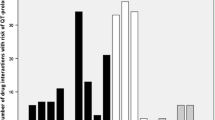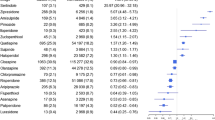Abstract
At least 170 approved drugs are linked to QT prolongation, which can lead to serious adverse drug reactions (ADRs), such as Torsade de Pointes (TdP). The aim of this study was to analyze the prevalence and type of pharmacodynamic drug–drug interactions (DDIs) between QT-prolonging drugs in psychiatry. The present retrospective analysis used data from a large pharmacovigilance study, conducted in 10 psychiatric hospitals in Germany. Patients medication lists were screened for QT-prolonging drugs, classified according to the Arizona Center for Education and Research on Therapeutics (AZCERT). In total, 27,396 patient cases (46% female) with a mean (± standard deviation) age of 47 ± 18 years were included in the study. Altogether, 83% of the cases received at least one and up to eight QT-prolonging drugs at the same time. Combination of drugs with a known or possible risk for TdP (according to the AZCERT) was detected in 13,670 cases (50%). Most frequently prescribed psychotropic high-risk drugs (n = 48,995) were the antipsychotics pipamperone (n = 6202), quetiapine (n = 5718), prothipendyl (n = 4298), and risperidone (n = 4265). The replacement of high-risk drugs such as tricyclic antidepressants, levomepromazine, melperone, and promethazine with more tolerable drugs could avoid 11% of QT-prolonging drugs and increase the tolerability of psychopharmacological treatment. More than 80% of psychiatric patients receive at least one QT-prolonging drug during their hospital stay, and almost 50% of these drugs are combined in clinical practice. For the prevention of cardiac ADRs, the physician should evaluate the risk for QT prolongation for each drug and patient-specific risk factors before prescribing these drugs or drug combinations.

Similar content being viewed by others
Data availability
Data transparency was given and controlled by external government in Hesse, Germany.
References
Barbui C et al (2016) Antipsychotic dose mediates the association between polypharmacy and corrected QT interval. PLoS ONE 11:e0148212. https://doi.org/10.1371/journal.pone.0148212
Beach SR, Celano CM, Sugrue AM, Adams C, Ackerman MJ, Noseworthy PA, Huffman JC (2018) QT prolongation, torsades de pointes, and psychotropic medications: a 5-year update. Psychosomatics 59:105–122. https://doi.org/10.1016/j.psym.2017.10.009
Carmona-Huerta J et al (2019) Polypharmacy in a hospitalized psychiatric population: risk estimation and damage quantification. BMC Psychiatry 19:78. https://doi.org/10.1186/s12888-019-2056-0
Carvalho AF, Sharma MS, Brunoni AR, Vieta E, Fava GA (2016) The safety, tolerability and risks associated with the use of newer generation antidepressant drugs: a critical review of the literature. Psychother Psychosom 85:270–288. https://doi.org/10.1159/000447034
Das B, Rawat VS, Ramasubbu SK, Kumar B (2019) Frequency, characteristics and nature of risk factors associated with use of QT interval prolonging medications and related drug-drug interactions in a cohort of psychiatry patients. Therapie. https://doi.org/10.1016/j.therap.2019.03.008
Desai N, Venkatesh CR, Kumar SS (2015) QT prolongation and torsades de pointes with psychotropic agents. Indian J Psychiatry 57:305–308. https://doi.org/10.4103/0019-5545.166619
Elliott A et al (2018) QTc interval in patients with schizophrenia receiving antipsychotic treatment as monotherapy or polypharmacy. CNS Spectr 23:278–283. https://doi.org/10.1017/s1092852917000402
Fulton MM, Allen ER (2005) Polypharmacy in the elderly: a literature review. J Am Acad Nurse Pract 17:123–132
Greil W, Haberle A, Haueis P, Grohmann R, Russmann S (2012) Pharmacotherapeutic trends in 2231 psychiatric inpatients with bipolar depression from the International AMSP Project between 1994 and 2009. J Affect Disord 136:534–542. https://doi.org/10.1016/j.jad.2011.10.033
Hasnain M, Vieweg WV (2014) QTc interval prolongation and torsade de pointes associated with second-generation antipsychotics and antidepressants: a comprehensive review. CNS Drugs 28:887–920. https://doi.org/10.1007/s40263-014-0196-9
Hefner G, Laib AK, Sigurdsson H, Hohner M, Hiemke C (2013) The value of drug and metabolite concentration in blood as a biomarker of psychopharmacological therapy. Int Rev Psychiatry 25:494–508. https://doi.org/10.3109/09540261.2013.836475
Hefner G, Hahn M, Hohner M, Roll SC, Klimke A, Hiemke C (2019) QTc time correlates with amitriptyline and venlafaxine serum levels in elderly psychiatric inpatients. Pharmacopsychiatry 52:38–43. https://doi.org/10.1055/s-0044-102009
Hiemke C et al (2018) Consensus guidelines for therapeutic drug monitoring in neuropsychopharmacology: update 2017. Pharmacopsychiatry 51:9–62. https://doi.org/10.1055/s-0043-116492
Holt S, Schmiedl S, Thurmann PA (2010) Potentially inappropriate medications in the elderly: the PRISCUS list. Dtsch Arztebl Int 107:543–551. https://doi.org/10.3238/arztebl.2010.0543
Kadra G et al (2018) Antipsychotic polypharmacy prescribing and risk of hospital readmission. Psychopharmacology 235:281–289. https://doi.org/10.1007/s00213-017-4767-6
Mangoni AA, Jackson SHD (2003) Age-related changes in pharmacokinetics and pharmacodynamics: basic principles and practical applications. Br J Clin Pharmacol 57:6–14. https://doi.org/10.1046/j.1365-2125.2003.02007.x
Meid AD et al (2017) Combinations of QTc-prolonging drugs: towards disentangling pharmacokinetic and pharmacodynamic effects in their potentially additive nature. Ther Adv Psychopharmacol 7:251–264. https://doi.org/10.1177/2045125317721662
Nosè M et al (2016) Prevalence and correlates of QTc prolongation in Italian psychiatric care: cross-sectional multicentre study. Epidemiol Psychiatr Sci 25:532–540. https://doi.org/10.1017/s2045796015000906
Ray WA, Chung CP, Murray KT, Hall K, Stein CM (2009) Atypical antipsychotic drugs and the risk of sudden cardiac death. N Engl J Med 360:225–235. https://doi.org/10.1056/NEJMoa0806994
Roden DM (2004) Drug therapy: drug-induced prolongation of the QT interval. N Engl J Med 350:1013–1022
Sigurdsson HP, Hefner G, Ben-Omar N, Kostlbacher A, Wenzel-Seifert K, Hiemke C, Haen E (2014) Steady-state serum concentrations of venlafaxine in patients with late-life depression. Impact of age, sex and BMI. J Neural Transm. https://doi.org/10.1007/s00702-014-1317-9
Simoons M et al (2018) Limited evidence for risk factors for proarrhythmia and sudden cardiac death in patients using antidepressants: Dutch consensus on ECG monitoring. Drug Saf 41:655–664. https://doi.org/10.1007/s40264-018-0649-z
Spindelegger CJ et al (2014) Cardiovascular adverse reactions during antidepressant treatment: a drug surveillance report of German-speaking countries between 1993 and 2010. Int J Neuropsychopharmacol. https://doi.org/10.1093/ijnp/pyu080
Takeuchi H, Suzuki T, Remington G, Uchida H (2015) Antipsychotic polypharmacy and corrected QT interval: a systematic review. Can J Psychiatry 60:215–222. https://doi.org/10.1177/070674371506000503
Tisdale JE, Jaynes HA, Kingery JR, Mourad NA, Trujillo TN, Overholser BR, Kovacs RJ (2013) Development and validation of a risk score to predict QT interval prolongation in hospitalized patients. Circ Cardiovasc Qual Outcomes 6:479–487. https://doi.org/10.1161/circoutcomes.113.000152
Unterecker S, Warrings B, Deckert J, Pfuhlmann B (2012) Correlation of QTc interval prolongation and serum level of citalopram after intoxication—a case report. Pharmacopsychiatry 45:30–34. https://doi.org/10.1055/s-0031-1286346
Vandael E, Vandenberk B, Vandenberghe J, Pince H, Willems R, Foulon V (2017a) Incidence of torsade de pointes in a tertiary hospital population. Int J Cardiol 243:511–515. https://doi.org/10.1016/j.ijcard.2017.05.072
Vandael E, Vandenberk B, Vandenberghe J, Spriet I, Willems R, Foulon V (2017b) Development of a risk score for QTc-prolongation: the RISQ-PATH study. Int J Clin Pharm 39:424–432. https://doi.org/10.1007/s11096-017-0446-2
Vandael E, Vandenberk B, Vandenberghe J, Willems R, Foulon V (2017c) Cases of drug-induced torsade de pointes: a review of belgian cases in the eudravigilance database. Acta Clin Belg 72:385–390. https://doi.org/10.1080/17843286.2017.1300217
Vandael E, Vandenberk B, Vandenberghe J, Willems R, Foulon V (2017d) Risk factors for QTc-prolongation: systematic review of the evidence. Int J Clin Pharm 39:16–25. https://doi.org/10.1007/s11096-016-0414-2
Vandael E, Vandenberk B, Willems R, Reyntens J, Vandenberghe J, Foulon V (2017e) Risk management of hospitalized psychiatric patients taking multiple QTc-prolonging drugs. J Clin Psychopharmacol 37:540–545. https://doi.org/10.1097/jcp.0000000000000758
Wenzel-Seifert K, Wittmann M, Haen E (2011) QTc prolongation by psychotropic drugs and the risk of Torsade de Pointes. Dtsch Arztebl Int 108:687–693. https://doi.org/10.3238/arztebl.2011.0687
Woosley RL, Heise CW, Gallo T, Tate J, Woosley D and Romero KA. www.CredibleMeds.org, QTdrugs List, [06/2019], AZCERT, Inc 1822 Innovation Park Dr, Oro Valley, AZ 85755
Acknowledgements
The authors are very grateful to all 10 participating hospitals for their voluntary collection of data.
Funding
The Federal Joint Committee (G-BA, project executing organization: Deutsches Zentrum für Luft- und Raumfahrt, DLR) is funding healthcare research projects that aim to optimize quality of care for statutory insured persons in Germany. In this regard, the innovative study “Optimization of pharmacological treatment in hospitalized psychiatric patients” (OSA-PSY, study number 01VSF16009, ethical approval reference number FF 116/2017) is sponsored by the DLR.
Author information
Authors and Affiliations
Contributions
GH did literature search, analysis, pharmacological interpretation, and wrote the final manuscript. MH, SCR, ST, and CH did analysis and pharmacological interpretation of the manuscript. JW did statistical analysis of patient data. AK gave the idea, made data analysis and interpretation of study results.
Corresponding author
Ethics declarations
Conflict of interest
Gudrun Hefner, Martina Hahn, Sibylle C. Roll, Jan Wolff and Ansgar Klimke declare no conflicts of interest/competing interests. Sermin Toto has been a member of an advisory board for Otsouka, and has received speaker’s honoraria from Janssen Cilag, Lundbeck, Otsouka and Servier. Christoph Hiemke has received speaker’s and consultancy fees from Stada, Lohmann Transdermal Systems and Otsuka during the last two years.
Ethical approval
Ethical approval in November 2017 in Hesse, Germany; reference number FF 116/2017.
Consent to participate and for publications
All authors consent to participate in this study and for publication of this study results.
Additional information
Publisher's Note
Springer Nature remains neutral with regard to jurisdictional claims in published maps and institutional affiliations.
Rights and permissions
About this article
Cite this article
Hefner, G., Hahn, M., Hiemke, C. et al. Pharmacodynamic Drug–Drug interactions of QT-prolonging drugs in hospitalized psychiatric patients. J Neural Transm 128, 243–252 (2021). https://doi.org/10.1007/s00702-020-02291-y
Received:
Accepted:
Published:
Issue Date:
DOI: https://doi.org/10.1007/s00702-020-02291-y




